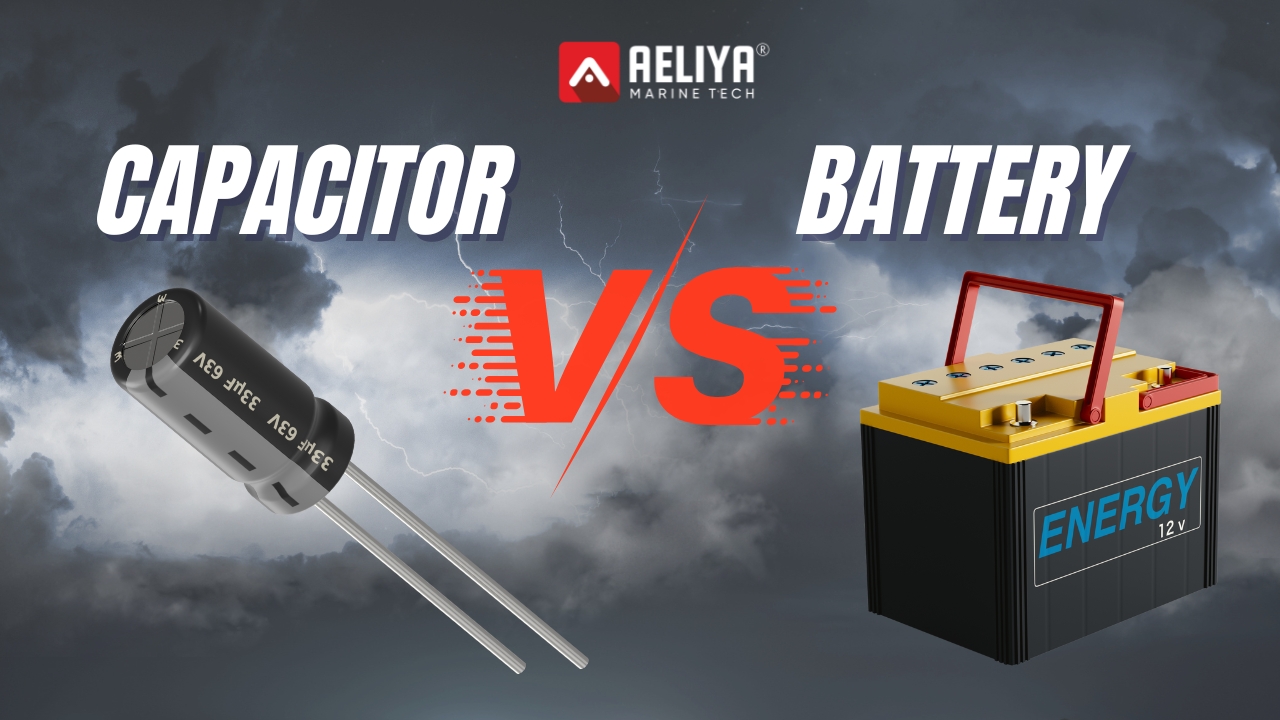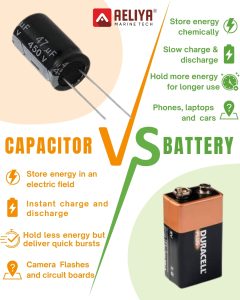Understanding Capacitors
A capacitor is a device that holds electrical energy in an electric field. It is made of two conducting plates with an insulator in between, referred to as a dielectric. Upon connection of a voltage across the plates, an electric charge builds up on the plates, generating an electric field.
How Capacitors Work
- Capacitors hold energy in an electrostatic field between the plates.
- They charge and discharge rapidly, making them well-suited for short-term energy storage.
- The stored energy is a function of the capacitance and applied voltage.
Benefits of Capacitors
Rapid Charging & Discharging – Capacitors charge and discharge virtually instantly.
Long Life – They can support millions of charge cycles with minimal degradation.
High Power Output – Capacitors supply high bursts of power for short periods.
Reliable & Maintenance-Free – No chemical reactions take place, resulting in a long working life.
Disadvantages of Capacitors
Limited Energy Storage – Store much less energy than batteries.
No Constant Voltage Output – Voltage falls rapidly as the charge is drawn.
Not Suitable for Long-Term Energy Storage – Energy is lost very rapidly.
Understanding Batteries
A battery is a device for storing chemical energy that is transformed to electrical energy by electrochemical reactions. It is made up of one or more electrochemical cells, each with a positive and negative electrode divided by an electrolyte.
How Batteries Work
- Batteries store energy in the form of chemicals and release it as electrical energy when required.
- They offer a constant voltage output over time.
- Batteries are charged and discharged more slowly than capacitors.
Benefits of Batteries
High Energy Density – A big capacity for holding energy.
Stable Voltage Output – Maintains a constant voltage supply.
Long-Term Energy Storage – Sustains the charge over extended periods of time.
Portable & Versatile – Applied in devices ranging from minor electronics to motor vehicles.
Disadvantages of Batteries
Few Charge/Discharge Cycles – Lose capability over a duration of time and must be replaced.
Slow Charging & Discharging – Consumes time in topping up the power.
Environmental Concerns – Many batteries contain hazardous materials that require proper disposal.
Bulkier Than Capacitors – Batteries are larger and heavier for the same energy output.
Capacitor vs Battery: Key Differences
| Feature | Capacitor | Battery |
|---|---|---|
| Energy Storage | Stores energy electrostatically | Stores energy chemically |
| Charge/Discharge Time | Very fast | Slow |
| Lifespan | Very long | Shorter due to chemical degradation |
| Power Output | High bursts of power | Steady and sustained power |
| Energy Density | Low | High |
| Self-Discharge Rate | High | Low |
| Size & Weight | Small and lightweight | Heavier and bulkier |
| Environmental Impact | Eco-friendly, no toxic waste | Can be hazardous due to chemicals |
When to Use a Capacitor
Power Conditioning: Smoothest power supply fluctuations.
Backup Power: Temporary backup for memory storage (e.g., computer RTC).
Pulsed Power Applications: Employed in camera flashes and defibrillators.
Energy Harvesting: Stores small quantities of energy from renewable sources.
Electronic Circuits: Employed for filtering and signal processing.
When to Use a Battery
Long-Term Power Storage: Best suited for applications that need prolonged power delivery.
Portable Electronics: Utilized in phones, laptops, and wearables.
Electric Vehicles (EVs): Delivers extended power to motors.
Uninterruptible Power Supplies (UPS): Saves power during outages.
Remote & Standalone Systems: Necessary for devices working in isolated locations.


